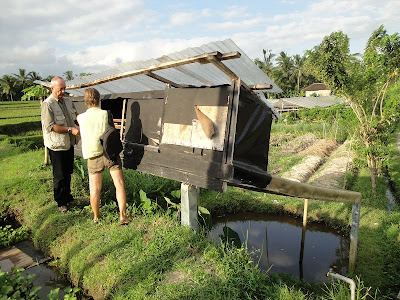Beate organised again a day fully packed with exciting events:
- at
Gaia Oasis, Tejakula and Abasan: waste water garden and organic vegetable gardens
- at the home of Markus and Mank: waste water garden and solar energy system
- at Renate's place: Aqua Fitness
When I arrived at Warung Bambu 15 minutes too early I met her munching homemade bread and cake and joined for a kopi Bali. Soon after Burgel und Burkhard arrived and the cake had to be saved for Beate's kids. At 8.30am the expected transport had not arrived so we mounted our motor bikes and headed eastward along the coast to Gaia Oasis where our host Sabine welcomed us with drinks, lots of fruits and these yummy belinjo chips. As there were some new faces around the table we started with an introductory round: Burgel, Carlos, Jenny, Markus, Beate, Mank, Burkhard, Sabine, Renate, Violetta and me. Welcome everybody! Great to see so many people interested in Permaculture.
For those not so familiar with Permaculture, find a definition
here.
1. Soap nuts or krerek in bahasaBeate told us about her first experiments in using them for washing, as dishwashing liquid and hair shampoo against dandruff. Better don't try to mix them in a blender as you can get explosive results with soap nut liquid splattered all over the kitchen!
Burgel gave us her recipe for using the soap nuts in the washing machine: soak about 12 nuts in water, open them, wrap them in a textile bag and put them into the washing machine. It is not recommended to reuse the nuts because most of the saponine will be rinsed off during the washing cycle. But they still can go to the compost heap.
Here you can find more information about soap nuts or just google soap nuts.
 2. Waste water garden
2. Waste water gardenBeate showed and explained us the waste water system at Gaia Oasis with the grease trap and the cleaning plant.
Most of the waste water of restaurants and hotels in Bali still go untreated to rivers and to the sea. Reasons for this might be ignorance and giving low priority to the issue by owners when investing. We all can help to build awareness of the issue by getting interested and curious and asking questions in the hotels and restaurants where we are guests.
 3. Garden tour at Gaia Oasis Abasan
3. Garden tour at Gaia Oasis AbasanSabine and her gardeners took us on a tour through the vast property. The Lontar palm indicates that the climate here is more dry than around Singaraja. We discussed the local way of
composting: just digging a hole and filling it with organic matter and then covering it with earth. Very energy saving, but during the rainy season probably too moist and no oxigen. We opened a hole and found some sticky earth with rotted leaves, not bad smelling, but not as good as this crumbly, black, earthy smelling stuff from a compost heap. We still wonder how anaerobic composting works and why it is less recommended than aerobic composting. This is some homework, guys!
Another subject was the
water treatment in swimming pools. How does a chlorinator work? What chemical processes and elements are involved? Some more homework! But even without understanding the pool chemistry the water in the swimming pools of Gaia Oasis looked very clean and refreshing and there was no chlorine to smell.
The garden beds were not mulched. Sabine explained that it is difficult to motivate the gardeners for
mulching. They usually just put the cow shit on top of the earth. Does that hurt the plants or can this cause diseases in humans when they eat the plants?
During the tour the gardeners kept feeding us with freshly picked rambutans. The markisas were thriving and we passed beds of beans, corn, basil, aloe vera, salads and other greens and medicinal plants.
The first rain drops and a rolling thunder reminded us to head back to the restaurant. But not before we got that lemon basil plant that Sabine offered us for taking home.
Time to say Good-bye to Sabine and her gardeners, to Jenny, Carlos, Renate and Violetta who had other duties.
 4. Visit at the home of Markus and Mank
4. Visit at the home of Markus and MankAfter a stopover at a Warung down by the beach we went on to the home of Markus and Mank to see their newly installed solar energy system.
There are 2 providers for solar panels in Bali: Contained energy and Solar Power Indonesia. Markus brought some of his equipment like the inverter from germany. He explained us the main elements of his solar energy system: solar panels, car batteries, inverter and control unit. Well done! We all except Burkhard envy Mank for such a technically talented husband.
As it was already 4pm and the clouds looked heavy with rain I passed on Renate's invitation to water therapy.
Thanks a lot to Beate for organizing the day and to Sabine, Markus, Mank and Renate for hosting us.
Next meeting: Beate plans a trip to South Bali to visit the show room of Solar Power Indonesia. She will email the details.




































